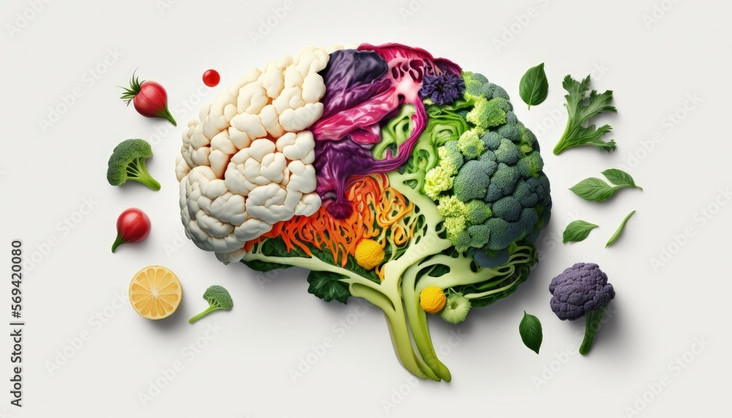

Your brain is the command center of your body — controlling memory, emotions, creativity, focus, and decision-making. Taking care of your brain health is just as important as maintaining physical fitness. Yet, many people overlook it until they start noticing forgetfulness, brain fog, or low concentration.
The good news is that your brain can stay strong, sharp, and resilient throughout life — if you nurture it the right way. This guide explores the best lifestyle habits, nutrition tips, and mind-boosting strategies to keep your brain health at its best.

Brain health refers to how well your brain functions in different areas — thinking, learning, feeling, and remembering. A healthy brain allows you to stay focused, make smart decisions, manage emotions, and live independently as you age.
Your brain’s performance depends on several factors such as diet, sleep, physical activity, mental engagement, and emotional balance. Protecting your brain now helps prevent cognitive decline and promotes lifelong mental clarity.
A healthy brain affects every part of your life — from how you think and react to how happy and productive you feel. When your brain health is strong:
On the other hand, poor brain health can lead to forgetfulness, anxiety, and reduced focus. Over time, it can affect work performance, relationships, and overall quality of life.
Taking small steps every day can significantly strengthen your brain and protect it for the long term.
What you eat directly influences how your brain functions. Certain foods support memory, learning, and concentration, while others slow you down.
Avoid processed foods, excess sugar, and trans fats, which can harm brain cells and reduce energy levels.
For more brain health tips and natural nutrition advice, visit Cognigen Plus.
Physical exercise isn’t just good for your body — it’s essential for your brain health. Regular activity increases blood flow, delivering oxygen and nutrients that keep brain cells alive and active.
Even 30 minutes of physical activity daily can stimulate growth in brain regions related to memory and learning.
Sleep is one of the most powerful ways to protect your brain health. During deep sleep, your brain clears toxins, processes information, and stores memories.
Chronic sleep deprivation can cause poor concentration, mood swings, and even memory loss.
To improve sleep quality:
A well-rested brain performs better, learns faster, and stays emotionally balanced.
Just as muscles get stronger with exercise, your brain thrives on mental challenges. Engaging your mind in new and stimulating activities can strengthen neural connections and delay cognitive decline.
Try:
Continually feeding your curiosity keeps your brain health vibrant and adaptable.
Chronic stress can harm brain cells and shrink areas responsible for memory and learning. To maintain optimal brain health, it’s essential to manage stress effectively.
A calm, balanced mind supports better mental performance and overall happiness.
Your brain is about 75% water — even mild dehydration can cause headaches, fatigue, and confusion. Drinking enough water is vital for maintaining brain health.
Aim for 7–8 glasses of water a day, and include hydrating foods like cucumbers, watermelon, and oranges. Avoid excessive alcohol or sugary drinks that drain mental energy.
Certain habits can negatively affect brain health over time. These include:
Protecting your brain also means minimizing exposure to environmental toxins, using protective headgear during sports, and staying mentally active.
Social interaction is a powerful way to keep your brain sharp. Conversations, laughter, and shared activities stimulate your mind and reduce loneliness — a major risk factor for cognitive decline.
Spending time with friends, volunteering, or joining group activities provides emotional support that strengthens your brain health and overall well-being.
Consistency is key when it comes to improving brain health. You don’t need dramatic lifestyle changes — just small, steady habits.
When you make these habits part of your everyday life, you create a strong foundation for long-term cognitive vitality.
Want to sharpen your focus and memory naturally? Try these tips:
Small daily actions like these can lead to noticeable improvements in your brain health and performance.
As we age, it’s normal for processing speed and memory to slow slightly. However, maintaining healthy habits can preserve your brain’s strength and adaptability.
Lifelong learning, staying socially active, eating well, and exercising can help you enjoy sharp thinking and emotional balance well into your later years.
For more brain health strategies and natural support tips, visit Cognigen Plus.
Your brain health is the foundation of your entire well-being. By making smart choices in diet, exercise, sleep, and mental activity, you can protect your memory, focus, and creativity for life.
Even small, consistent changes can have a lasting impact — keeping your mind young, sharp, and full of energy.
Start today with one healthy habit, and you’ll soon notice the difference in how clearly you think and how alive you feel.
This product is very helpful for this problem.
click here